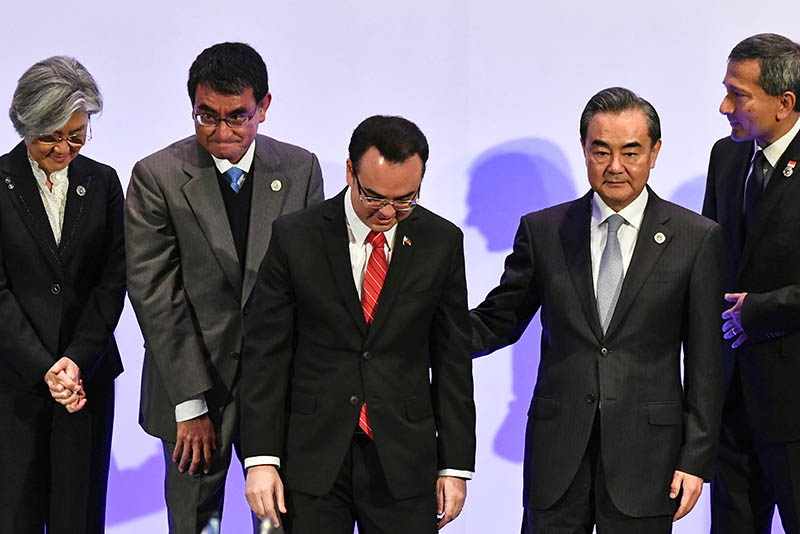Analyst: Philippines, China should abandon 'secret diplomacy'

Foreign Ministers, from left, South Korea's Kang Kyung-wha, Japan's Taro Kono, Philippines' Foreign Secretary Alan Peter Cayetano, China's Wang Yi and Singapore's Vivian Balakrishnan walk after a family photo before the 18th ASEAN Plus Three Foreign Ministers Meeting, part of the 50th Association of Southeast Asian Nations (ASEAN) Regional Forum (ARF) meeting in Manila, Philippines, Monday, Aug. 7, 2017. Mohd Rasfan/Pool Photo via AP
MANILA, Philippines — Manila and Beijing must be transparent in their dealings if they want to shelve sovereignty disputes and in favor of joint development, a policy analyst said.
Jeffrey Ordaniel, a research fellow at the Center for Strategic and International Studies, said that the Philippines and China should learn from the Joint Seismic Marine Undertaking (JMSU) between the Philippines, China and Vietnam in 2005.
The JMSU was supposed to be a test case for joint exploration of disputed waters, particularly the South China Sea, but it failed.
Ordaniel noted that the JMSU resulted into corruption scandals as it was directly connected to the $904.38-million NBN-ZTE broadband deal.
Manila's "secretive diplomacy" at the time meant that there was insufficient public scrutiny prior to the signing of the JMSU, Ordaniel said.
"Secret diplomacy could result in unpleasant surprises, and legal challenges in the Philippines," Ordaniel said in his article published by the CSIS on its website.
The policy analyst stressed that Manila and Beijing should avoid a repeat of the JMSU fiasco.
"When Cayetano told the press that he should not talk publicly about the matter and that joint exploration initiatives could be part of other cooperation agreements with China, it sounded like JMSU all over again," he said.
Beijing, on the other hand, should refrain from linking development deal to joint exploration as the South China Sea dispute should be separate from overall China-Philippines relations.
The Philippines could turn to other overseas development assistance such as Japan if China will continue to link its deals to development loans and investment pledges, Ordaniel said.
"Finally, joint development in the South China Sea should begin in areas that are outside disputed EEZs but are within the nine-dash lines," Ordaniel said.
Pursuing joint exploration outside disputed exclusive economic zones would not violate each other's domestic laws and the UN Convention on the law of the sea, according to the analyst.
"For instance, there is a sizable maritime space in the Spratlys that is outside the EEZ of any littoral state in the South China Sea, per the July 2016 ruling, and which was covered by the JMSU," he said.
Last month, state-owned Philippine National Oil Company and China National Offshore Oil Corporation signed a deal intending to follow their 2006 agreement on hydrocarbon exploration in the South China Sea.
The deal, however, does not cover Beijing's so-called nine-dash line claim over the disputed waters.
- Latest
- Trending
































